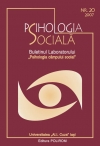Efectul Muhammad Ali la adolescenţii delincvenţi şi nedelincvenţi. Importanţa grupului de referinţã şi a sensului comparaţiei
The Muhammad Ali effect in delinquent and nondelinquent adolescents. The importance and meaning of the reference group and of the sense of comparison
Author(s): Gabriela Florea, Mihaela BozaSubject(s): Psychology
Published by: EDITURA POLIROM S.A.
Summary/Abstract: The aim of this study is to verify the presence of the Muhammad Ali effect in delinquents and non-delinquents in different contexts of comparison. Allison and his colleagues (1989), Van Lange and Sedikides (1998) studied the fairness bias or the Muhammad Ali effect, also verified on Romanian subjects (Chelcea, 1999). The authors explain this effect through the differences existing between the evaluation of intelligence and fairness on three dimensions: desirability, controllability and verifiability. We have a combined design 2 × 2 × 2 × 2, with one between subjects. variable (delinquent/non-delinquent) and three within subjects. variables (fairness/intelligence, in group/out-group comparison, self/other comparison). The main hypothesis is that there are differences in the manifestation of fairness bias between delinquents and non-delinquents in different contexts of comparison. The subjects are 60 males aged from 13 to 15 years, 30 delinquents and 30 non-delinquents. The main hypothesis was confirmed. The fairness bias is present in all subjects, but the degree for its manifestation is variable in different contexts of comparison and across the three dimensions (desirability, controllability and verifiability) in delinquent and non-delinquent subjects.
Journal: Psihologia socială
- Issue Year: 2007
- Issue No: 20
- Page Range: 38-50
- Page Count: 13
- Language: Romanian

